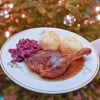How do Germans celebrate new year‘s eve?
The end of the calendar year is approaching, and you want to celebrate “Silvester” (New Year’s Eve) like the Germans do? Traditions in Germany.

Where does the term Silvester for New Year's Eve come from?
The name Silvester comes from a 4th century Roman saint: Pope Silvester I (also spelled Sylvester). Besides the fact that he served as pope from 314 to 335, very little is known about Sylvester, though several legends have sprung up around his name. One, sown in a forged account called “Donation of Constantine,” claimed that he had been miraculously cured of leprosy.
The feast of St. Sylvester—that is to say, his burial ceremony—took place on December 31, 335. When the Gregorian calendar was reformed in 1582, the last day of the year was placed on December 31st, combining Silvester’s feast day with what we now call New Year’s Eve. Despite the shared date, most German Silvester traditions actually stem from a far older pagan celebration called Raunächte.
Does Germany do fireworks for new years?
Making a lot of noise was an important part of these ancient year-end traditions, and it is likely that the fireworks set off in multitudes on New Year’s Eve today are the modern evolution of that tradition. After Christmas, fireworks begin to appear for sale in German shops and supermarkets. Unlike the United States, most fireworks are legal in Germany, and there are very few public fireworks displays—though the largest and most famous takes place at Berlin's Brandenburg Gate. Instead, almost the entire population sets off their own fireworks. On January 1st, the streets are awash with the red paper detritus that most fireworks leave behind.
Look to the Future
Some of the holiday’s quieter traditions surround predictions for the upcoming year. Bleigiessen (or pouring lead) is a favorite, and you can buy a Bleigiessen set in many stores during the month of December. A small metal figure is placed on a spoon and melted over a candle. The molten metal is then poured into a cup of cold water, and the resulting shape is then said to tell you something about the year ahead. In the spirit of bringing luck to the new year, lucky charms in the form of pigs, clover, ladybugs, and horseshoes are sometimes exchanged between friends.
How to eat and drink on new year’s eve like a German
In some regions, the traditional Silvester lunch is lentil soup. Each round lentil is seen as a symbol of a coin, and the soup’s consumption a tradition meant to open the doors to wealth in the new year.
One of the most common choices for New Year’s dinner is the swiss dish raclette. A mini stove range is set on the table, surrounded by bowls of prepared, but uncooked ingredients like cheese, potatoes, meat and vegetables. Each guest has his or her own little pan to cook a personal combination of the ingredients. Fondue is also a popular New Year's Eve dinner choice.
While you and your friends eat dinner, you can be sure that Dinner for One will be playing on television. This ten-minute-long British comedy sketch is shown on German television on New Year’s Eve every year and has a Guinness Record as the most frequently repeated television show in history because of it. You can watch it on youtube here.
After everyone is well-fed and their futures told, champagne and other alcoholic beverages are handed out (if they weren’t on the table already) in preparation for the strike of midnight when the fireworks begin, and friends and lovers exchange hugs and kisses and a toast to the new year.
The Morning After
The morning of January 1st in inevitably a quiet one, as the population sleeps off the previous night's celebrations. There are not many events on this day, but one of the most unique takes place in Füssen. As evening falls on New Year's Day, swimmers willing to brave the cold water take a torch-lit swim in the river Lech.
„Guten Rutsch“ oder „happy new year“?
In Germany it is just as common to wish each other "Happy New Year" or a "good slide into the new Year".
Wir wünschen einen guten Rutsch ins neue Jahr. (We wish you a happy new year (good slide).)
Ich wünsche ein frohes neues Jahr. (I wish you a happy new year.)
das Feuerwerk (the firework)
Mehr Sekt, bitte. (More champagne, please.)


